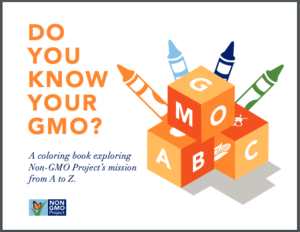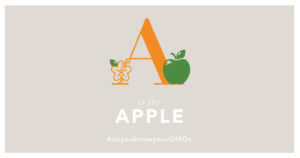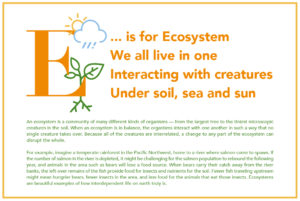Downloadable Resources
The ABCs of GMOs is available as a downloadable poster and in storybook form! Follow us on Twitter, Facebook and Instagram for details.
Do You Know Your GMOs?
 During the month of February, we went back to basics with the #DoYouKnowYourGMOs campaign, highlighting some of the most important creatures and concepts that impact our food and our planet. In case you saw these posts on social media and wondered why we were talking to you like you were four years old, keep in mind that everyone needs a place to start. This is an all-ages introduction to the complexities of nature with a beat you can dance to.
During the month of February, we went back to basics with the #DoYouKnowYourGMOs campaign, highlighting some of the most important creatures and concepts that impact our food and our planet. In case you saw these posts on social media and wondered why we were talking to you like you were four years old, keep in mind that everyone needs a place to start. This is an all-ages introduction to the complexities of nature with a beat you can dance to.
There was no shortage of topics to consider during the month. Choosing one topic per letter meant that there were other subjects we didn’t look into, but we’ll bring those to you (in prose rather than poetry form) in the coming months. Plotting out the month in verse really drove home how GMOs aren’t a “single-issue” issue anymore: They are one cog in a very elaborate and badly broken wheel. As we broaden our outlook to include our food, our future and our planet, the solutions we are looking for ultimately depend on interactions: Interactions across the globe, where trade agreements and economic trends produce — or fail to produce — meaningful regulation; interactions in the natural world, where there is always more than meets the eye; and most importantly, interactions between people. How we communicate our concerns and ideas to one another is the key to how we move forward. At the Non-GMO Project, we invite you to join this conversation.
 It can be comforting to look at things in isolation. Scientific discovery has traditionally depended on a reductive way of reasoning. This approach provided valuable data, leading us to where we are today. But now it is time to move beyond outdated ways of thinking. For natural systems, especially, conceiving of their components in isolation invites misunderstandings and false conclusions. As the great Dana Scully* once said, “Nothing happens in contradiction to nature, only in contradiction to what we know of it.”
It can be comforting to look at things in isolation. Scientific discovery has traditionally depended on a reductive way of reasoning. This approach provided valuable data, leading us to where we are today. But now it is time to move beyond outdated ways of thinking. For natural systems, especially, conceiving of their components in isolation invites misunderstandings and false conclusions. As the great Dana Scully* once said, “Nothing happens in contradiction to nature, only in contradiction to what we know of it.”
So true, Scully. So true.
Of course, she could have said the same thing about science. It is where these two intersect — at a point far beyond our view — that we have the greatest responsibility.
*The X-Files, Season 4 Episode 1, “Herrenvolk”
